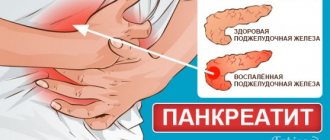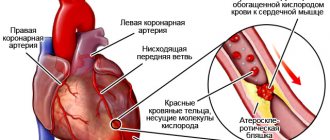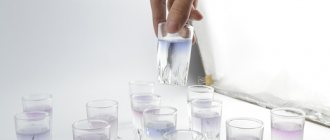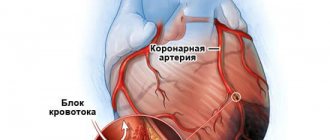Acute intoxication does not always require hospitalization, with the exception of conditions provoked by gases, drugs and toxic chemicals. In most cases, we are talking about household food poisoning, which sensible people are quite capable of coping with on their own.
However, provided that the sick person or his relatives are aware of the risk, know the rules of care and the symptoms that require a medical examination. And the main question of personal treatment is what to take at home in case of poisoning and how not to make it worse.
Help must be fast
Detailed information in the form of lists, tables, photos and videos in this article will help you navigate at the right time.
Alcohol poisoning: when does intoxication occur?
Drinking alcohol leads to intoxication - the nervous system at this time is in a special “floating” state from the psychoactive effects of ethanol. The good mood and feeling of euphoria that we look for at the bottom of a glass or shot glass are nothing more than the first signs of alcohol poisoning.
Even a few drops of alcohol affect the state of the body, and the more a person drinks, the more serious the consequences of intoxication will be. Alcoholic drinks vary in the strength of their effect on the nervous system. The most “harmless” is alcohol that contains no more than 15% ethanol: champagne, vermouth, wine and beer. But you shouldn’t get too carried away with strong drinks such as cognac, vodka, tequila, whiskey and gin. Absinthe is recognized as the strongest alcohol.
Saline solution for children
The recipe for preparing a solution for a child is no different from that used for adults. Only the amount you drink changes, as well as the dosage of the medicine. Even if the child has suffered from severe poisoning, the dose recommended by doctors should not be exceeded. For children it is 50 ml per 1 kg of weight. Mild food poisoning is treated with a dosage of 10 ml per 1 kg of weight. You need to drink the solution every 10 minutes. If, in addition to nausea, the child suffers from diarrhea or vomiting, the amount of solution should be increased to 25 ml per 1 kg of weight.
If symptoms of poisoning appear in your baby, you should immediately call an ambulance. Only after this should you try to alleviate the child’s condition with saline solution.
In case of poisoning, a saline solution is used to stabilize the water-electrolyte balance and relieve signs of intoxication. Due to disorders of the gastrointestinal tract (vomiting and diarrhea), the human body becomes dehydrated, losing vital mineral salts.
In case of poisoning, a saline solution stops the manifestations of intoxication and promotes rapid recovery of strength after illness. To do this, the sick person is given water and salt, which they make themselves or purchase at the pharmacy.
Alcohol poisoning: stages
The damage to the body by the components of alcohol occurs as follows: ethanol in the “happy” drink enters the stomach and is soon absorbed by the mucous membranes, through which it enters the blood. The liver will neutralize a certain portion of toxic substances, but the organ will not be able to completely neutralize a large proportion of alcohol, then the unprocessed poison penetrates into the brain tissue. It is at this stage that irreversible changes occur in the structure of neurons and the functions of internal organs.
Intoxication resulting from alcohol consumption is classified into several stages. The degree of poisoning can be accurately determined by laboratory testing based on the number of ppm in the blood. How intoxicated a person is can also be determined by the corresponding symptoms of alcohol poisoning.
Mild alcohol poisoning
For the sake of a pleasant feeling of slight intoxication, an alcoholic drink is, in fact, placed on the table. A couple of glasses of wine - and you are guaranteed an emotional uplift, slight excitement, as well as unmotivated bliss. In such a state, it is difficult to assess your real capabilities; rather, you want to inflate them. However, in reality, the number of errors in the work of a drunk person increases, and his mental and physical activity noticeably decreases. A mild degree of alcohol poisoning can be identified by dilated pupils and a slightly reddened face. The drinker sweats more and feels the need to empty the bladder more often.
In addition, a drunk person begins to raise his voice, all his statements become more categorical and uncompromising. He has difficulty expressing his thoughts coherently and concentrating. Sweeping movements, “floating” facial expressions, loss of control over hidden personality traits are also considered symptoms of mild intoxication. Usually a person comes to his senses quite quickly and easily.
Moderate degree of alcohol poisoning
Signs of moderate alcohol intoxication cause more serious concerns: a person’s coordination of movements is impaired, he “throws” from side to side, sees double, and loses intelligibility of speech. In this state, the drinker is not responsible for his words and actions. In general, the behavior of a drunk person is determined by his character - alcohol can cause excessive boastfulness, bravado, vulnerability, touchiness, scandalousness or aggression. Sobering up brings general weakness, excruciating headaches, severe thirst, nausea and vomiting.
Severe alcohol poisoning
When a drunken person's condition worsens, his statements become illegible and meaningless, and he himself ceases to understand anything. A flushed face, hot skin and low pain sensitivity complement the overall picture of severe intoxication of the body. While intoxicated, a person can be seriously injured and not feel it.
A severe degree of alcohol intoxication has dire consequences: a heavily intoxicated person has difficulty breathing and may experience cardiac arrest. When a portion of alcohol enters the body, which in terms of pure alcohol is equal to 300–400 g, acute alcohol poisoning occurs. This condition is extremely dangerous, its main symptoms are as follows:
- convulsions;
- breathing problems;
- copious secretion of saliva;
- redness of the whites of the eyes.
A person with acute alcohol intoxication requires emergency medical care.
Alcohol coma
Severe alcohol poisoning can be complicated by the stage at which the intoxicated person falls into a coma. A comatose state is a kind of stunning of the body that occurs when ethanol in the blood increases to 3%. The main symptom of approaching danger is deep fainting. In some cases, the victim’s behavior is characterized by slight motor agitation. An indicator of the deterioration of the well-being of a person who has had too much alcohol is his eyes:
- There is no reaction of the pupils to light, the corneal reflex does not work (the eyelids do not close if you carefully touch the cornea).
- There is nystagmus (movement of the eyeballs according to the principle of a pendulum).
- Constriction of the pupils can also indicate an approaching alcoholic coma. In some cases, the pupils either narrow or dilate. Sometimes you can observe a picture when at the same moment the pupils of the left and right eyes have different sizes.
Due to the recession of the tongue, penetration of vomit into the respiratory tract, excessive secretion of saliva and phlegm, the victim’s breathing becomes impaired: the person breathes unevenly and intermittently, sometimes wheezes, while his face acquires a bluish tint. Blood pressure in alcoholic coma is reduced, and the pulse is weak and thready. In this condition, involuntary release of urine and feces is often observed.
Preparation and use
Saline solution can be prepared in several ways. The simplest among them is prepared as follows:
prepare 3-5 liters of boiled water, cooled to room temperature (20-24 degrees); the temperature regime must be observed, since if the solution is too cold, it will cause stomach spasms; add sugar (1 tablespoon per liter), kitchen salt (1 teaspoon per liter), soda (0.5 teaspoon per liter) to the water; All components are thoroughly mixed until completely dissolved.
Drink the prepared solution in small sips. After each liter there is a break of 5-10 minutes.
If necessary, you can provoke a stomach spasm and subsequent gag reflex. This should only be done if there is a urge to feel sick.
To quickly prepare a solution, you can use pharmaceutical preparations such as Regidron. It is an easily soluble powder, and it also contains potassium.
Poisoning with surrogate alcohol
Poisoning is caused not only by large doses of alcohol, but also by low-quality alcohol or its surrogates. Alcohol surrogates are liquids that are not intended for internal consumption, but are often used instead of alcoholic beverages (due to their lower cost). Drinking medicinal tinctures, colognes, lotions, denatured alcohol, moonshine, mash, “chat” and other dangerous liquids always ends in failure. The symptoms of intoxication will be somewhat different than with classic alcohol poisoning.
After taking a surrogate, a person practically does not get drunk, but if you know the symptoms of poisoning, you can notice them immediately:
- noise in ears;
- impaired vision and smell;
- increased salivation;
- abdominal pain.
If a person is not helped in time, he may die. Treatment for poisoning with surrogate alcohol is not carried out at home - as soon as there is suspicion of intoxication, you should immediately call an ambulance. If it is possible to deliver the victim to the hospital faster than the ambulance arrives, you should do just that. The sooner a patient is treated by qualified doctors, the greater his chances of survival.
Features of taking a water-salt solution
Before you start preparing the solution, you need to learn about all the features of its use:
- This drug should not be used to rinse the stomach. Saline solution is not suitable for rinsing in case of poisoning. Potassium permanganate diluted with water will cope better with this.
- People suffering from stomach ulcers should use the solution with extreme caution. For this disease, the dosage of the drug should not exceed 6-8 ml per 1 kg of weight.
- If you feel the urge to vomit from drinking the solution, you need to rinse your mouth a little with warm water. Then you need to continue drinking the medicine in small sips.
- Even if the signs of poisoning have disappeared, treatment with saline solution should not be stopped. You just need to reduce its daily dose. When symptoms decrease, you need to drink the solution two or three times a day.
- In case of poisoning, a water-salt solution will not eliminate the cause of the disease. It only reduces the symptoms and makes the person’s condition easier.
First aid for alcohol poisoning
Without resorting to the services of doctors, you can cope with mild to moderate poisoning on your own. There are a number of measures that will help bring the injured person to his senses: rid his body of ethanol residues and neutralize decay products.
Gastric lavage for alcohol poisoning
No medications should be taken, since many drugs in combination with alcohol create an “explosive” mixture, which will only worsen the victim’s condition.
Give the intoxicated person 300–500 ml of water to drink. This is necessary in order to induce vomiting and thus rid the stomach of the contents. In most cases, you don’t even have to press on the root of the tongue with your fingers - vomiting opens on its own, as the body tries to independently expel what is poisoning it. You will have to provoke vomiting until clean water begins to come out of the stomach.
Important! You cannot force water in or induce vomiting if a person has lost consciousness. Instead, it is better to wait until the ambulance arrives. At this time, you need to turn the patient on his side, free him from tight clothes and try to bring him out of fainting: intensively massage his ears, sprinkle with water, bring ammonia to his nose.
In cases where uncontrollable vomiting persists even after complete emptying of the stomach, the following techniques will help to cope with its urges:
- hold your head under running cold water or apply ice to the back of your head;
- take an anti-vomiting medicine (such as metoclopramide). If this does not have any effect, and the vomit is replaced by blood or bile, you need to take the victim to the hospital as soon as possible.
Restore fluid balance in the body in case of alcohol poisoning
The next step in helping with alcohol poisoning is to eliminate the lack of fluid in the body. Due to intoxication, the process of dehydration develops: ethanol causes a diuretic effect, and the liquid is excreted from the body with urine, as well as vomit. In especially severe cases, dehydration threatens a person’s life. Give the victim any liquid to drink. Mineral water or pure water with lemon juice is best. If a person is tormented by vomiting, pharmaceutical saline solutions such as Regidron and Gidrovit will help restore the balance of moisture in the body.
This remedy can also be prepared at home: dissolve 1 tsp in 1 liter of water at room temperature. table salt and soda, and then add 4 tbsp. l. Sahara. The victim should take the healing solution 2 to 3 sips every 30 minutes.
Treatment with sorbents and beneficial bacteria for alcohol poisoning
Help for alcohol poisoning at home is unthinkable without the use of sorbents. Medicines Polysorb (1 tbsp per 0.5 tbsp of water), Smecta (one-time 3 sachets per 1 tbsp of water), Enterosgel (50 g per 1 tbsp of water) will significantly improve the condition of a person suffering from alcohol intoxication. By the way, many people consider activated charcoal in case of alcohol poisoning to be almost the only remedy for eliminating poor health. In fact, the sorption capabilities of the drug are not very large, but because of the reasonable price, they continue to take it “for old times’ sake”: 1 tablet per 10 kg of body weight, washed down with water. The drugs described above are needed to remove toxic waste products from the body and reduce diarrhea. Medicines in this group are not taken together with other medications, so an interval of about 2 hours should be maintained.
If severe diarrhea appears due to poisoning, it is imperative to restore the intestinal microflora. Special complexes of beneficial bacteria Acipol, Yogurt, Linex will help solve this issue.
Important! Diarrhea in case of alcohol poisoning cannot be purposefully eliminated - this is another protective reaction in addition to vomiting, with the help of which the body gets rid of toxic substances.
Eliminate pain from alcohol poisoning
The headache of moderate alcohol poisoning can sometimes drive you crazy. You cannot tolerate painful sensations - the pain syndrome must be blocked. Aspirin is not suitable for this purpose, since acetylsalicylic acid in combination with ethanol will not bring any benefit to the body. Then what to drink if you have alcohol poisoning? The best way to relieve pain is with ibuprofen-based analgesics.
Types of diarrhea
When food poisons and toxins enter the gastrointestinal tract, their active reproduction begins. The invading bacteria die and become irritants for the stomach. Intestinal function is disrupted, salts and water accumulate in large quantities, and diarrhea begins. Intoxication of the body with a specific toxin provokes a certain type of stool.
Types of diarrhea after poisoning:
- When invasive, inflammation in the large intestine is diagnosed. There is loose stool with the presence of blood and intestinal mucus. The color of stool is yellow.
- During secretory diarrhea, the intestinal lumen fills with water. Chlorine and sodium ions accumulate. Feces are released in liquid form with bloody discharge.
- The osmotic type occurs when the body does not absorb water and immediately eliminates it.
- The hypermotor type is characterized by strong contractions of the intestinal walls.
No one can say for sure when diarrhea occurs after poisoning. Probably in 3-5 hours or later. Fecal discharge is abundant, containing intestinal mucus, pieces of food, and sometimes with admixtures of blood. Pain in the abdominal area always accompanies it and occurs in an acute form.
Folk remedies for alcohol poisoning
People have come up with many ways to overcome hangovers and alcohol poisoning without pills:
- Dilute 2 tbsp in 1 liter of boiled water. l. honey and take several sips throughout the day.
- Prepare a decoction of tansy - a wonderful remedy for poisoning of any kind. Take 50 g of dried raw material and brew it with boiling water (0.5 l), then add 20 g of chamomile flowers. The cooled and strained product should be taken with meals at the rate of 1 tbsp. l. per 10 kg body weight.
- After violent libations, ammonia solution will quickly bring you back to life; in everyday life - ammonia. Dissolve 10 drops of the product in a glass of water. You need to take the medicine 1 - 2 small sips every 30 minutes.
- If you are tormented by nausea, you can save yourself with a decoction of lemon balm. 1 tsp Add 250 ml of boiling water to the dried and crushed raw materials, let it brew a little, and then drink a healthy drink instead of tea. For taste, you can add a little honey and a slice of lemon to the product.
- The fastest way for your body to get rid of toxic toxins is to drink lemon, orange or grapefruit juice throughout the day.
The morning after a party where there was a lot of drinking, you need to allow yourself to rest. Alcohol poisoning cannot be tolerated on your feet. The best thing to do is take a cool shower, don’t force yourself to eat, and drink a lot of plain water. If there is a feeling of general malaise, you need to go to bed and not get up until the weakness goes away. If after 10 hours your health does not return to normal, you should consult a doctor.
What to do after vomiting
After completely emptying the stomach of food residues, you always feel severe weakness and dizziness. To help your body recover properly:
- Rinse your mouth with clean water. Even if there are no food particles left in the mouth, gastric juice may remain on the surface of the mucous membrane, which will cause additional irritation. For this reason, you should not brush your teeth earlier than half an hour after vomiting - otherwise the acid will damage the tooth enamel.
- Drink a decoction of medicinal herbs. After vomiting, chamomile and ginger tea, lemon balm or fennel infusion are especially useful. The drink should be warm, but not hot; You can add a little flower honey to it.
- When you feel an appetite, eat a light dish - yogurt, oatmeal, banana, baked apple. For the next 1–2 days, it is advisable to adhere to a gentle diet to speed up the recovery of the digestive tract. During this period, refrain from smoking, spicy and sour foods, as well as drinking alcohol.
Be sure to give your body a rest.
How to drink for adults
In case of poisoning of various etiologies, it is important to understand that saline solution is not a panacea for the disease and is taken together with medications.
It should be noted that the solution is taken by adult patients:
- Suspension with salt is not used for gastric lavage. This function is performed well by a weak solution of potassium permanganate.
- Take the medicine while the main symptoms are present.
- In case of alcohol intoxication, the use of saline solution is acceptable. However, this only applies to hangover syndrome. If alcohol poisoning is severe, medical attention is needed.
- When the medicine provokes an attack of vomiting, use should be stopped and mouth rinses should be used. Repeat this until the symptoms disappear.











